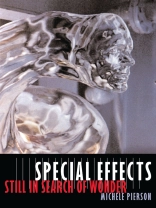Designed to trick the eye and stimulate the imagination, special effects have changed the way we look at films and the worlds created in them. Computer-generated imagery (CGI), as seen in Hollywood blockbusters like Star Wars, Terminator 2, Jurassic Park, Independence Day, Men in Black, and The Matrix, is just the latest advance in the evolution of special effects. Even as special effects have been marveled at by millions, this is the first investigation of their broader cultural reception. Moving from an exploration of nineteenth-century popular science and magic to the Hollywood science fiction cinema of our time, Special Effects examines the history, advancements, and connoisseurship of special effects, asking what makes certain types of cinematic effects special, why this matters, and for whom. Michele Pierson shows how popular science magazines, genre filmzines, and computer lifestyle magazines have articulated an aesthetic criticism of this emerging art form and have helped shape how these hugely popular on-screen technological wonders have been viewed by moviegoers.
विषयसूची
Introduction: Special Effects and the Popular Media
1. Magic, Science, Art: Before Cinema
Natural Magic
Science Fictions
Scientific American
Millenial Magic
2. From Cult-classicism to Techno-futurism: Converging on Wired magazine
The Limits of Convergence
Photon and Stop-motion animation
Corporate-futurism/Techno-futurism
Home-production
3. The Wonder Years and Beyond: 1989-1995
On Genre
Reinventing the Cinema of Attractions
Digital Artifacts
Retro-future/Retro-vision
4. Crafting a Future for CGI
The Case of Editing
Disaster Strikes
An Aesthetics of Scarcity
The Public Life of Numbers
Conclusion: The Transnational Matrix of SF
Notes
Bibliography
Index
लेखक के बारे में
Michele Pierson is lecturer in film studies and visual culture at the University of Queensland, Australia.












